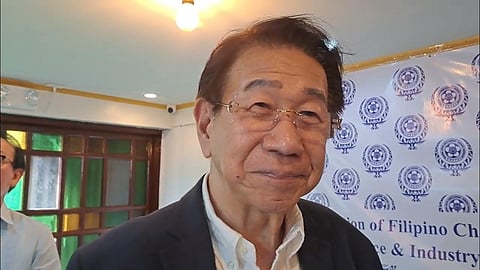
- NEWS
- the EDIT
- COMMENTARY
- BUSINESS
- LIFE
- SHOW
- ACTION
- GLOBAL GOALS
- SNAPS
- DYARYO TIRADA
- MORE

Following the imposition of 20 percent tariff by United States President Donald Trump on all US-bound exports, the Federation of Filipino Chinese Chambers of Commerce and Industry Inc. (FFCCCII) expressed grave concern, deeming the escalated tariff rates punitive to all exporting Filipino business owners.
In a statement on Friday, FFCCCII president Victor Lim said such unilateral measures violate fundamental World Trade Organization principles of non-discrimination and fair trade, threatening to disrupt carefully developed supply chains, harm businesses and consumers in both nations, undermine the rules-based global trading system, and set dangerous precedents for economic fragmentation.
Renegotiation
The Philippine government, through the Office of the Special Assistant to the President for Economic and Investments Affairs, and the Department of Trade and Industry, said it will renegotiate the US government’s decision, with SAPEIA Frederic Go and DTI Secretary Cristina Roque set to fly to Washington D.C. next week for a second round of negotiations with US Trade Representative Jamieson Greer.
“The FFCCCII supports efforts by the government to use diplomacy to negotiate fairness and to protect Philippine national interests and our economy,” the FFCCCII president said.
With the tariff imposition set to take effect on 1 August, the FFCCCII has called for strict enforcement of anti-dumping regulations against flooding of unfairly priced imports; comprehensive measures to combat smuggling; and support mechanisms for affected agricultural and manufacturing sectors.
Bilateral consultations
“Our domestic industries require and deserve a level playing field in global markets. Protect our workers and farmers. Rather than counterproductive tariffs, we propose to have immediate bilateral consultations to resolve trade concerns; accelerated negotiations for a US-Philippines Free Trade Agreement; strengthened multilateral engagement through WTO mechanisms, and cooperative solutions that promote stability and shared prosperity,” the group leader said.
Despite this, Lim said the FFCCCII remains committed to advocating for fair trade practices and sustainable economic partnerships that benefit all stakeholders.
Diversify export markets
The Philippine Chamber of Commerce and Industry (PCCI) likewise expressed concerns about the significant challenges the 20 percent tariff poses to the competitiveness of the country’s industries with significant exports to the US market, industries that are within their value chain, and their workers.
According to PCCI president Enunina Mangio, the development underscores the importance of diversifying the country’s export markets, strengthening regional trade partnerships, and investing in domestic competitiveness.
“We call on our government for greater support to our local industries by increasing the budget for research, development, technology, and market intelligence, and improving our supply chain efficiency, infrastructure, and cost competitiveness. To remain viable in a shifting global market, we must accelerate investments in automation, logistics, and workforce upskilling,” she said.
Explore pathways
The PCCI also urged the government to continue engaging with the US government to explore pathways toward a more equitable and sustainable trade relationship.
“We are hopeful that through a constructive dialogue, both governments will uphold a mutually beneficial trade relationship,” said Mangio.
